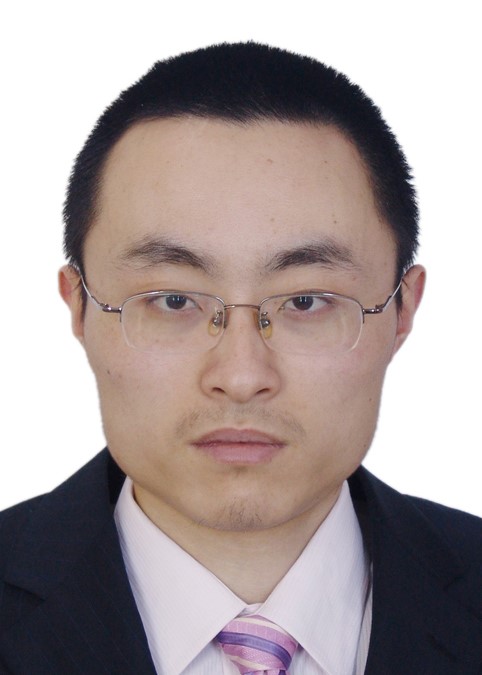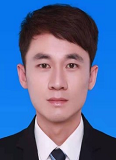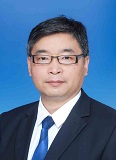

Prof. Yu-Dong Zhang
IEEE Senior Member
University of Leicester, UK
Title: Recent Signal Processing Methods for Medical Image Analysis
Abstract:
The field of medical image analysis has witnessed remarkable advancements in recent years, largely attributed to the incredible potential of signal processing theories, methods, and techniques. This talk aims to provide an overview of our group’s advancements of signal processing methods in medical image analysis. The talk will begin with an introduction to deep learning and its vital networks, such as convolutional neural network, advanced pooling networks, graph convolutional networks, attention neural networks, weakly supervised networks, vision transformers, etc. We will explore how these neural networks can be tailored and applied to various medical imaging modalities, including magnetic resonance imaging, computed tomography, and histopathology slides. Furthermore, we will discuss the challenges faced in medical image analysis, such as limited labelled data, class imbalance, and interpretability, and delve into the theories and techniques employed to mitigate these issues.
Biography:
Prof. Yudong Zhang is a Chair Professor at the School of Computing and Mathematical Sciences, University of Leicester, UK. His research interests include deep learning and medical image analysis. He is the Fellow of IET, Fellow of EAI, and Fellow of BCS. He is the Senior Member of IEEE and ACM. He is the Distinguished Speaker of ACM. He was 2019, 2021 & 2022 recipient of Clarivate Highly Cited Researcher. He has (co)authored over 400 peer-reviewed articles. There are more than 60 ESI Highly Cited Papers and 5 ESI Hot Papers in his (co)authored publications. His citation reached 25579 in Google Scholar (h-index 88). He is the editor of Neural Networks, IEEE TITS, IEEE TCSVT, IEEE JBHI, etc. He has conducted many successful industrial projects and academic grants from NIH, Royal Society, British Council, GCRF, EPSRC, MRC, BBSRC, Hope, and NSFC. He has served as (Co-)Chair for more than 60 international conferences (including more than 20 IEEE or ACM conferences). More than 60 news presses have reported his research outputs, such as Reuters, BBC, Telegraph, Physics World, UK Today News, Mirror, etc.

Prof. Anand Nayyar
Duy Tan University, Vietnam
Biography:
Dr. Anand Nayyar received Ph.D (Computer Science) from Desh Bhagat University in 2017 in the area of Wireless Sensor Networks, Swarm Intelligence and Network Simulation. He is currently working in School of Computer Science-Duy Tan University, Da Nang, Vietnam as Professor, Scientist, Vice-Chairman (Research) and Director- IoT and Intelligent Systems Lab. A Certified Professional with 100+ Professional certifications from CISCO, Microsoft, Amazon, EC-Council, Oracle, Google, Beingcert, EXIN, GAQM, Cyberoam and many more. Published more than 150+ Research Papers in various High-Quality ISI-SCI/SCIE/SSCI Impact Factor Journals cum Scopus/ESCI indexed Journals, 70+ Papers in International Conferences indexed with Springer, IEEE and ACM Digital Library, 40+ Book Chapters in various SCOPUS/WEB OF SCIENCE Indexed Books with Springer, CRC Press, Wiley, IET, Elsevier with Citations: 8700+, H-Index: 50 and I-Index: 170. Member of more than 60+ Associations as Senior and Life Member including IEEE, ACM. He has authored/co-authored cum Edited 50+ Books of Computer Science. Associated with more than 500+ International Conferences as Programme Committee/Chair/Advisory Board/Review Board member. He has 18 Australian Patents, 4 German Patents, 2 Japanese Patents, 16 Indian Design cum Utility Patents, 1 USA Patent, 3 Indian Copyrights and 2 Canadian Copyrights to his credit in the area of Wireless Communications, Artificial Intelligence, Cloud Computing, IoT and Image Processing. Awarded 40 Awards for Teaching and Research—Young Scientist, Best Scientist, Best Senior Scientist, Asia Top 50 Academicians and Researchers, Young Researcher Award, Outstanding Researcher Award, Excellence in Teaching, Best Senior Scientist Award, DTU Best Professor and Researcher Award- 2019, 2020-2021, 2022 and many more. He is listed in Top 2% Scientists as per Stanford University (2020, 2021, 2022) and Listed on Research.com (Top Scientist of Computer Science in Viet Nam- National Ranking: 2; D-Index: 31). He is acting as Associate Editor for Wireless Networks (Springer), Computer Communications (Elsevier), International Journal of Sensor Networks (IJSNET) (Inderscience), Frontiers in Computer Science, PeerJ Computer Science, Human Centric Computing and Information Sciences (HCIS), Tech Science Press- CSSE, IASC, IET-Quantum Communications, IET Wireless Sensor Systems, IET Networks, IJDST, IJISP, IJCINI, IJGC, IJSIR. He is acting as Editor-in-Chief of IGI-Global, USA Journal titled “International Journal of Smart Vehicles and Smart Transportation (IJSVST)”. He has reviewed more than 2500+ Articles for diverse Web of Science and Scopus Indexed Journals. He is currently researching in the area of Wireless Sensor Networks, Internet of Things, Swarm Intelligence, Cloud Computing, Artificial Intelligence, Drones, Blockchain, Cyber Security, Healthcare Informatics, Big Data and Wireless Communications.

Assoc. Prof. Marcin Paprzycki
IEEE Senior Member
Systems Research Institute, Polish Academy of Sciences, Poland
Biography:
Marcin PAPRZYCKI, Associate Professor of Systems Research Institute Polish Academy of Sciences. He has an MS degree from the Adam Mickiewicz University in Poznań, Poland, a Ph.D. from the Southern Methodist University in Dallas, Texas, USA, and a Doctor of Science degree from the Bulgarian Academy of Sciences, Sofia, Bulgaria. He is a Senior Member of IEEE, a Senior Member of ACM, a Senior Fulbright Lecturer, and was an IEEE CS Distinguished Visitor.
His original research interests were in the area of high performance computing / parallel computing / computational mathematics. Over time they shifted towards intelligent systems, software agents and agent systems, and application of semantic technologies, among others. Currently he serves as Vice-Chair of IEEE Poland Section. He has contributed to more than 500 publications, and was invited to the program committees of over 800 international conferences. He is on the editorial boards of 15 journals.

Prof. Guoqing Wang
IEEE Member
University of Electronic Science and Technology of China, China
Biography:
Prof. Guoqing Wang received his Ph.D. degree in Jan 2021 from the University of New South Wales (UNSW). In April 2021, Dr. Wang joined School of Computer Science and Engineering, University of Electronic Science and Technology of China (UESTC) as a professor. He receives NSFC Excellent Young Scientists Fund (Overseas) in 2022. His current research interests include artificial intelligence and visual understanding, with special focus on designing intelligent visual systems operating in open world. He has authored over 80 top-tier papers in these areas over various venues including IJCV, IEEE TIP, IEEE TIFS, IEEE TMM, CVPR, ICCV, ACM MM, etc. He served as the Program Chair of SoCAV 2023, Session Chair of ACM MM 2022 and ICME 2022, and SPC of AAAI 2023. He served as the reviewer of the IEEE TAMI, IEEE TIP, IEEE TIFS, IEEE TMM and IEEE TCSVT and regular (Senior) TPC of CVPR, ICCV, ECCV, ACM MM, AAAI, IJCAI and the guest editor of several international journals. He is a recipient of the Dean's Award for Outstanding PhD Theses(2021), UNSW/CSIRO Full Postgraduate Scholarships (2017-2021) and ICCV Student Travel Grant (2019). Prof. Wang hosts/participates numbers of national projects, including the Scientific Innovation 2030 Major Project for New Generation of AI, the National Natural Science Foundation of China, Australian National R&D project, etc.

Prof. Yanfeng Li
Beijing Jiaotong University, China
Title: Lesion Analysis Methods in Automated Breast Ultrasound (ABUS) Image
Abstract:
Breast cancer has become the most common tumor among women worldwide, which seriously threatens women’s health and quality of life. Improving the accuracy of breast cancer screening at the early stage plays an important role in the prevention and treatment of breast cancer. Recently, automated breast ultrasound (ABUS) examination gradually received high attention among clinicians and researchers, because of its non-radiation, simple operation, and traceability. However, manual reviewing of ABUS images is a very time-consuming task, and the diagnosis accuracy is highly dependent on the clinicians’ experience. Therefore, lesion analysis methods based on artificial intelligent technology is of great significance.
The challenge of lesion analysis methods include large shape and size variations, serious unbalance between tumors and backgrounds, random tumor location, unclear boundary and enormous cost of annotation. Aiming at these problems, we have delved into the key issues of tumor detection, segmentation, and benign-malignant classification. For tumor detection, we have proposed Bayesian-YOLOv4 model, the multi-view fusion-based model, and the semi-supervised SSL-EfficientDet model. For tumor segmentation, we have proposed the deepest semantically guided network, the semi-supervised UATE model, the NAS based network, and an end-to-end cross-model fusion method. For tumor classification, a multi-task learning method is designed.
Biography:
Yanfeng Li is a professor in Beijing Jiaotong University. She has been engaged in information processing and artificial intelligence research for a long time. In recent years, she has undertaken more than 20 projects, including the National Nature Science Foundation of China, and the enterprise deferred projects. She has published more than 40 papers in IEEE TIP, IEEE TMI, IEEE TCSVT, PR and other top journals in this field. Her main interest includes medical image analysis, object detection, person ReID, and deep learning. For medical image analysis, she has proposed a series of methods in ABUS tumor detection and segmentation, pulmonary MRI tumor segmentation and multi-modal information fusion, mammographic tumor detection and classification. For person ReID, she has proposed a series of methods in supervised ReID, unsupervised ReID, cross-modality ReID and domain generalization ReID. More information can visit:http://eie.bjtu.edu.cn/WebHtml/szdw/0406

Assoc. Prof. Xubin Sun
IEEE Member
Beijing Jiaotong University, China
Title: Integrated Scheduling and Control for Freight Trains Based on Intelligent Computing
Abstract:
Freight trains play an important role in the freight transportation. Most freight trains are scheduled and control separately, which leads to high energy consumption of the freight trains and low track utilization. To solve this problem, our team develops an integrated scheduling and control system for the single-track freight trains based on intelligent computing, which consists of three parts: the Scheduling Advisory System(SAS), the in-cab Driver Advisory System(DAS) and the Station Terminal(ST). The SAS obtains the train schedule from the Centralized Traffic Control system and optimizes the original schedule using Mixed Integer Programming Algorithm, the results of which is presented to the dispatcher as a reference. The DAS system receives the optimized schedule and calculates the optimal train speed profile using the Rolling Optimization Algorithm, and the result is shown as an operation advice by an in-cab terminal. The ST shows the train real-time position and train schedule to the station dispatcher. The developed integrated scheduling and control system is applied in Dalailong Railway in Shandong Province, which improves the energy efficiency and the track utilization of the railway.
Biography:
Xubin Sun is an Associate Professor with the School of Electronic and Information Engineering, Beijing Jiaotong University, and director of Rail Transit Control and Anti-Interference Laboratory. He received the B.S. degree in Electrical Engineering and Automation from Beijing Jiaotong University in 2002, and the Ph.D. degree from the Institute of Automation, Chinese Academy of Sciences in 2007. His conference paper was awarded the Best Paper in Logistics in IEEE ICAL 2012 and the paper published in IEEE/CAA Journal of Automatica Sinica was selected as “Academic Paper that Have Received Widespread Attention in Beijing Region” in 2022. His research interests include signal processing, train energy-efficient control, and driver advisory system. He was the review expert of discipline evaluation of the Ministry of Education of P. R. China in 2022, and expert of Domestic Shadow Working Group for ISO standard of “Railway Applications - Principles of Train Detection for Operations and Services”.

Assoc. Prof. Taogang Hou
Beijing Jiaotong University, China
Title: A novel coding marker for moving Robot tagging based on event camera
Abstract:
The event camera is a novel visual sensor that only captures brightness changes. It has the advantages of high dynamic range, low latency and no motion blur, which has great potential in high-speed tasks. In this invited talk, the main topic is about the combination of traditional frame-based cameras and event cameras. We propose a refined registration method for the event and RGB cameras (RRER) based on pixel-level region segmentation, providing a fusion method at the pixel level. Moreover, we designed a kind of marker using LED dot matrix for event camera with reference to ArUco marker, named as EVNT-ArUco. A detection method is proposed to identify EVNT-ArUco marker by capturing information of alternating bright and dark changes of LED matrix, which achieving better tracking under poor exposure conditions and fast motion environments.
Biography:
Taogang Hou received the B.E. degree and Ph.D. degree in mechanical engineering from Beihang University, Beijing, China, in 2016 and 2020. He is currently an associate professor with the School of Electronic and Information Engineering, Beijing Jiaotong University, China. He has been selected to join “Youth Talent Support Project” of the Chinese Association for Science and Technology. His research interests include intelligent robotics, visual perception under high-speed movement and smart transportation system. He is now a member of the Intelligent Robot Technical Committee of the China Computer Federation (CCF), a member of the Professional Committee of Cognitive Systems and Information Processing of the Chinese Association for Artificial Intelligence (CAAI), and a member of the Medical-Industrial Integration Professional Committee of the China Health Culture Association (CHCA). He has presided several projects supported by National Natural Science Foundation of China, Beijing Natural Science Foundation and China Postdoctoral Science Foundation. He has published more than 20 academic papers in journals such as Mech. Mach. Theory and IEEE International Conference on Robotics (ICRA). He has also guided students to win the Gold Prize of the “Challenge Cup” National College Student Entrepreneurship Competition and the First Prize of the "Challenge Cup" National Undergraduate Extracurricular Academic Science and Technology Contest.

Prof. Hoshang Kolivand
Liverpool John Moores University, UK
Biography:
Hoshang Kolivand is Senior Lecturer in Computer Graphics at the Department of Computer Science, Liverpool John Moores University, UK. He received his MSc degree in Applied Mathematics and Computer Science from Amirkabir University of Technology, Tehran, Iran, and his PhD from Universiti Teknologi Malaysia (UTM) in 2013. His background is in 3D maths & Computer Graphics in particular Augmented and Virtual Reality. Over 150 international publications in the area of 3D visualisation, immersive technology & human Computer Interaction. A global leader in this field invited to address the current & future advances of immersive technology in several high ranked international events.